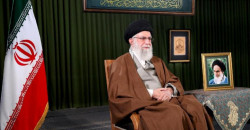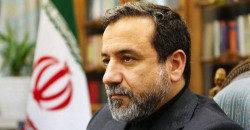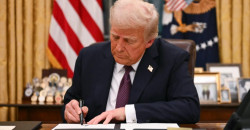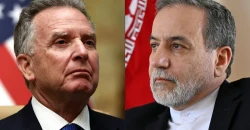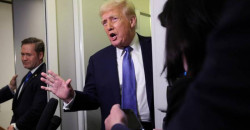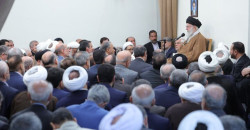Nuclear standoff: Tehran defiant, Washington draws red lines
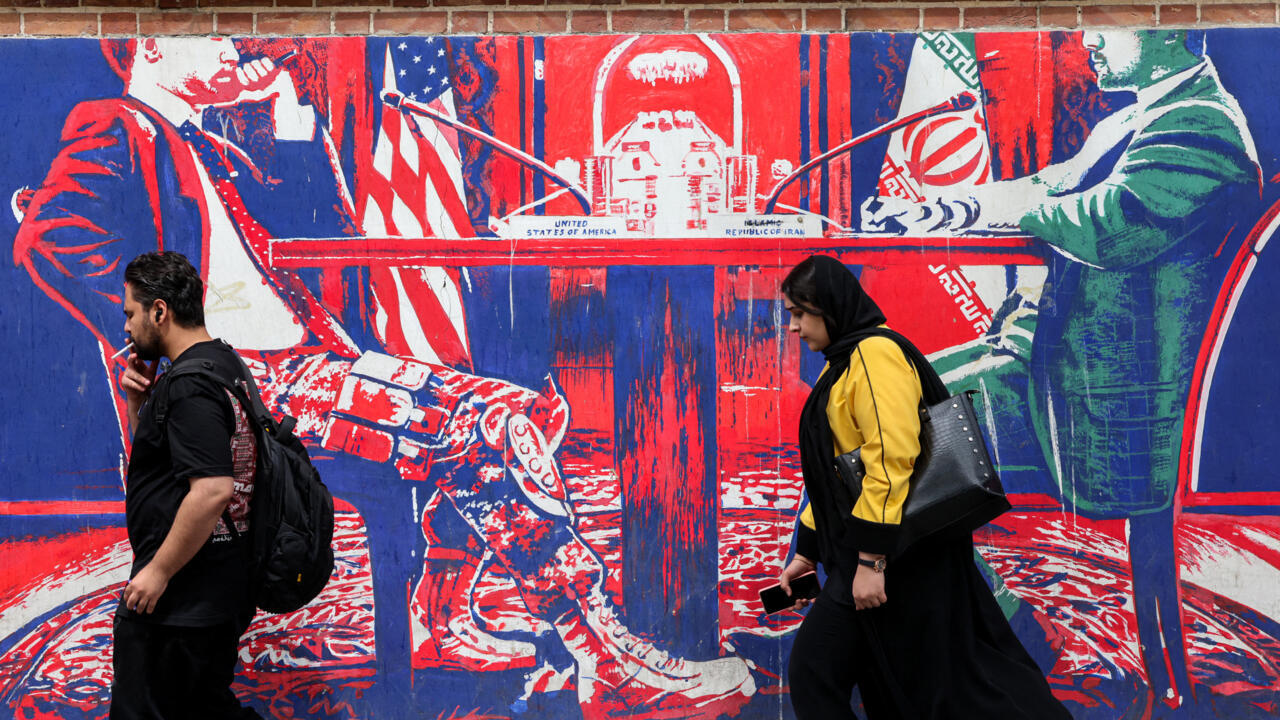
Shafaq News/ After four rounds of hushed, backchannel diplomacy in Muscat and Rome, the Iran nuclear talks are teetering on the edge. What was once confined to backchannels is now emerging into the open, reflected in increasingly rigid official statements, exposing a sobering reality: the negotiations have reached their most fragile point since the 2018 collapse. With each round, one truth hardens, Tehran and Washington remain locked in parallel dialogues that refuse to intersect.
The long-awaited political breakthrough has not materialized. Positions have solidified, and the rhetoric has turned increasingly combative. In his latest speech, Iran’s Supreme Leader Ali Khamenei struck what observers called his most pessimistic tone since the talks began, "The Islamic Republic does not see the ongoing negotiations with America yielding positive results," he said, asserting that Iran would not wait for anyone’s approval.
He further accused the West of harboring hidden agendas behind its focus on uranium enrichment, "The West’s obsession with enrichment is not innocent." Khamenei concluded, "We do not know what will happen."
This sharp escalation goes beyond media theatrics, says Dr. Jalal Jaraghi, an expert in Iranian and regional affairs. Speaking to Shafaq News, he described a two-layered landscape, “One is media-driven, mastered by the US through alternating threats and reassurances in a carrot-and-stick policy. The other is real negotiations occurring quietly through Omani mediation.”
Jaraghi emphasized that Iran views Uranium enrichment as a sovereign right, grounded in Article IV of the Nuclear Non-Proliferation Treaty (NPT), which permits member states to enrich uranium for peaceful purposes.
"Iran has enriched up to 60%, and that’s legal," he noted, drawing parallels with other cases like Japan and Argentina, which enrich to similar levels without building nuclear weapons. "There should be no automatic link between enrichment and weaponization."
US Pressure, Iranian Defiance
The US Administration has adopted a tactical approach marked by conflicting signals aimed at keeping Tehran off balance. One day, President Donald Trump expresses optimism about sealing a deal with Iran; the next, he warns of dire consequences if Tehran fails to engage quickly. Experts see this as psychological warfare designed to unsettle decision-makers in Iran.
Analysts in both Washington and Tehran, who spoke to Shafaq news, agree that Trump’s bluster is more pressure tactic than a policy plan. Iranian officials argue that Washington’s ever-shifting demands and negotiating frameworks only hinder progress.
Meanwhile, Chief negotiator and Foreign Minister Abbas Araghchi has repeatedly declared that Iran’s Uranium enrichment is “non-negotiable,” flatly rejecting the US demand for “zero enrichment.”
Iran has gone further, publicly asserting that no agreement will involve dismantling centrifuges or exporting enriched Uranium.
From Tehran, International Relations Researcher Fatemeh Sayahi told Shafaq News the nuclear issue has outgrown its scientific and diplomatic roots, “It’s now about sovereignty and political identity for Iran.”
Sayahi stressed that while Iran is open to lowering enrichment levels, “It will never accept zero enrichment.” Even reformists who once advocated compromise now reject the idea, especially in light of recent US threats and perceived provocations like attempts to rename the Persian Gulf.
Sayahi criticized the West’s latest offer, keeping nuclear facilities while halting enrichment, as unrealistic. “Iran believes rebuilding the infrastructure is easier than losing the capability itself. Knowledge and expertise cannot be bombed. Preserving technical capacity is the last line of strategic deterrence."
America’s Red Line
Across the negotiating table, US envoy Steve Witkoff struck a hard line, “We have one very, very clear red line, and that is enrichment. We cannot allow even 1% of an enrichment capability," he said, warning that any level of enrichment could be seen as preparation for a nuclear weapon. Iranian officials viewed his remarks as a complete rejection of the 2015 accord’s foundations.
Such rigidity on both sides has led many observers to question the viability of continuing negotiations.
Still, some US experts urge caution in interpretation. Professor of Public and International affairs and the Associate Dean of the College of Public Affairs at the University of Baltimore Ivan Sascha Sheehan, told Shafaq News that “interpreting Mr. Witkoff’s statements as threatening, as some have done, is misguided,” adding that the administration has consistently communicated their conviction that a nuclear deal with the Islamic Republic is desirable and achievable, even as many in Washington’s policy community believe it is unlikely to prevent nuclear breakout or sneakout.
Referring to Araghchi’s remarks, Sheehan suggested they imply that the Trump White House holds unrealistic expectations, “a sign that the gap between the negotiating parties may be widening and positions are hardening.”
He believed that if ongoing discussions are unsuccessful, it is reasonable to assume that the United States will take decisive action. “What form that will take, when, and who will be involved is best left for another day.”
He added that the bottom line for now is that if Tehran is unwilling to concede the entirety of its nuclear program and subject itself to inspections and guardrails, what is likely to follow will be far worse than the “maximum pressure” policy that characterized the first Trump administration.
“The Trump administration has demonstrated patience through four rounds of talks. I suspect their patience may be wearing thin,” Sheehan concluded.
Iranian analyst Hassan Hashemian, speaking from Washington, offered a darker outlook. He saw the talks heading toward a dead end, "There are no real points of convergence. If the disputes persist, we might witness a gradual escalation starting with threats and moving to something more severe."
Hashemian stressed that direct conflict wouldn’t erupt until all political and media escalation phases are exhausted, describing Witkoff’s comments as emblematic of the new US doctrine, “No enrichment inside Iran, not even a little.”
He noted Araghchi’s recent statements were aimed less at the US and more at Iran’s domestic audience, saying that “the regime knows this round will end either in a fundamental concession or in a difficult confrontation.”
Internal Pressures Mount
Iran’s internal situation, according to Hashemian, leaves no room for compromise, “especially after the collapse of the Resistance Axis [Iran-aligned armed groups in the Middle East, mainly in Lebanon, Iraq, and Yemen] and the disintegration of basic services inside the country.”
Iran’s deteriorating economic situation intensifies this sense of siege. Inflation, unemployment, repeated protests, and near-collapse in public services have created what Jaraghi described as a “domestic pressure bomb.”
Hashemian warned that any flexibility on the nuclear file would be seen as a retreat, and might embolden rivals within the regime more than outside of it. “That’s why the only viable option for the leadership is to double down, even at the cost of deeper isolation.”
Final Chance or Precursor to Collapse?
In this tense context, questions swirl with no clear answers. Is Washington genuinely pursuing a deal or laying the groundwork for a preemptive strike? Is Tehran playing for time, or preparing a surprise shift in negotiations?
Caught in the middle is Oman, the cautious optimist hosting the talks. The upcoming fifth round has been described by one European diplomat as “the last chance to avoid the storm.”
Failure to break the deadlock could not only consign the nuclear deal to a slow death but push the entire region into a new phase—marked by zero-sum calculations, mutual deterrence, and the risk of an explosive misstep.
In the end, as analysts from Tehran and Washington told Shafaq News, the nuclear file has morphed into something far larger than a bilateral negotiation. It has become an open battlefield, where every scenario remains on the table.
